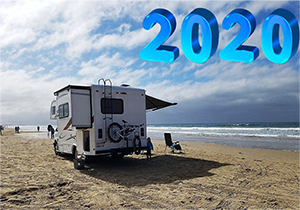Updated Economic Impact of the Canadian Recreation Vehicle Industry Shows Growth
The Recreation Vehicle Dealers Association (RVDA) of Canada and the Canadian Recreational Vehicle Association (CRVA) are releasing their updated study, showcasing the economic impact of the Canadian recreation vehicle (RV) industry.
| The study, conducted by The Portage Group Inc and urbanMetrrics inc, showcased that in 2019, the RV sector generated an estimated 67,200 jobs and delivered $4.8 billion in added economic value (GDP) to the Canadian economy from an initial expenditure of $6.2 billion. These factors have increased from the previous 2017 data. “With this recent data, we are able to highlight the significant contributions the industry makes to the Canadian economy” said Gord Bragg, RVDA of Canada Chairman of the Board. |  |
“The findings show that not only does RVing continue to be an exceptional way to vacation, but it also has a considerable economic impact. The updated 2020 Economic Impact of the Canadian RV Industry is also very timely as it will give us a baseline from which we will be able to measure the impact of the pandemic on the industry.”
 |
“2.1 million Canadian households own an RV” stated CRVA Chairman, Jeff McDermott. “And while manufacturers and dealers contribute considerably to the total economic activity, expenditures associated with RV ownership and use account for 78% of the total value added to the Canadian economy. Post-purchase spending by owners for services such as insurance, storage and accessories along with RV tourism related expenditures are significant contributors to the overall impact.” |
In order to determine the level of economic activity supported by the RV industry in Canada, the impacts of RVs were broken down through four distinct domains. Key findings are outlined below:
|
RV Manufacturing: The total value of recreation vehicles manufactured in Canada was approximately $416 million in 2019. As detailed below, the value of recreation vehicles manufactured in Canada in 2019—including direct, indirect and induced impacts—generates significant value for the Canadian economy.
Non‐Travel Related RV Expenditures: Overall, total non-travel related recreation vehicle expenditures for 2019 are estimated at some $1.7 billion. This substantial spending on items such as storage, insurance, as well as other equipment and accessories (excluding repairs) yields a significant economic impact across Canada.
|
RV Retail Sales and Service: The total value of recreation vehicles sold and serviced in Canada in 2019 was approximately $3.8 billion. In calculating the economic impact of RV retail activities, however, it is important to note that only the gross retail and wholesale markup components represent the unique contributions of retail sales and service activities. As detailed below, the value of recreation vehicles sold in Canada in 2019 generated:
Tourism Related RV Expenditures: It is estimated that RV owners spent a total of approximately $3.4 billion on various goods and services while travelling throughout Canada in 2019. This spending generates a significant benefit to local municipalities, the provincial/territorial economies, as well as spread more broadly across Canada at the federal level.
|
In sum, the RV sector stimulates economic activity and creates jobs for Canadians across the country. Across all four subsectors, total RV industry expenditures for 2019 have been estimated at approximately $6.2 billion. Moreover, the Canadian RV industry was a significant driver of tax revenues, with the industry contributing $1.9 billion in tax revenue to municipal, provincial and national governments, in the form of personal tax, corporate tax, and other taxes.
For further information or a copy of the full report, please contact:
Eleonore Hamm
604-718-6325
eleonore_hamm@rvda.ca
OR
Shane Devenish
905-315-3156
shane.devenish@crva.ca